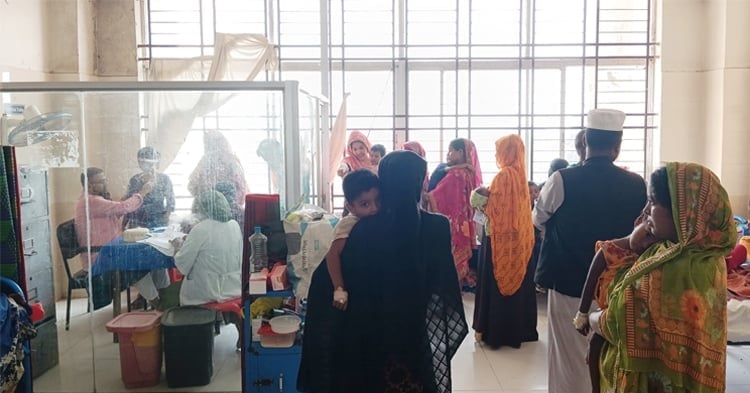Cold triggers winter diseases among children


Eighteen-month-old Rabiul Alam Nishat has been suffering from fever and diarrhea for several days along with symptoms of cold, cough, and breathing difficulties.
“Doctor advised us to use nebulizer for keeping his breathing system normal. But, he is a very grim condition due to fever as well as diarrhea,” said Rabiul’s father Rashedul Alam.
“It worsens every winter. It’s not just my child, many children in our neighborhood are also suffering from cold-related fever,” he said.
According to doctors, winter typically brings an uptick in various diseases including diarrhea, cold, cough, and respiratory problems among children.
For the last several days, the whole country including Dhaka city has been gripped by intense cold and dense fog bringing an uptick in cold-related illnesses, affecting the elderly and children most. Doctors and nurses in hospitals are scrambling to keep up with the surge in patients.
A visit to the capital’s key hospitals including Dhaka Medical College Hospital, Bangladesh Shishu Hospital, Maternal and Child Health Training Institute and International Centre for Diarrhoeal Disease Research found a notable increase in patients suffering from diarrhea and cold-related fevers.
Most of the patients admitted to the hospitals with cold and fever are children while number of children seeking outdoor treatment became almost doubled compared to normal time.
Talking to BSS, doctors attributed the surge in cold related illness this year to the sudden drop in temperature, which has caused increase the number of such cases twice or thrice.
A large number of children are suffering from respiratory infections and pneumonia, doctors said adding, asthma cases among children have also risen alarmingly.
Unfortunately, many parents bring their children to the hospital after initially self-medication from local pharmacies, which only worsen their health complications, said the doctors.
Seven-month-old Khalid Hasan from Kamrangirchar was admitted to Maternal and Child Health Training Institute Azimpur on December 18. His condition has improved slightly with the use of nebulizer three times a day, but he is still being treated for pneumonia.
Khalid is just one of the hundred other children who are currently admitted to the hospital with cold, cough, fever, diarrhea, pneumonia, and other illnesses.
Dr. Rabeya Sultana, a physician of Maternal and Child Health Training Institute, explained that the combination of winter and air pollution have posed significant health hazards for children.
The number of cold-related illnesses among patients is especially high, with many children currently hospitalized due to pneumonia. As the cold intensifies, the number of such patients is expected to rise, she observed.
Director of Bangladesh Shishu Hospital and Institute Professor Dr. Mahbubul Alam mentioned that chilly cold couple with air pollution is taking a toll on children's health.
Children are experiencing fever, cold, cough, and throat irritation. Children under two years old are suffering from bronchiolitis, while those over two years old are developing pneumonia. Children with asthma are at high risk during the winter months,” he said.
Dr Alam also highlighted that winter increases the risk of diarrhea among children, as they tend to drink less water compared to the summer months. He advised ensuring that children stay hydrated during winter along with recommending adults with fever, cold, or cough to wear masks at home to prevent infecting children.
“It is crucial to take extra care of children during this time as chilling cold makes the children most vulnerable to health complexities”, he added.
Dr. Nabila Akand, Assistant Professor of Dhaka Shishu Hospital’s respiratory department, explained that pneumonia symptoms include cough, fever, breathing difficulties, loss of appetite and vomiting.
If a newborn’s breathing rate exceeds 60 breaths per minute, or if a child over one-year-old breathes more than 50 times per minute, or a child aged one to five years breathes more than 40 times per minute, these are warning signs of a potential risk, she said adding in such cases, immediate medical attention is necessary.
Dr. Akand also emphasized the importance of breastfeeding for infants less than six months, as it significantly reduces health risks.
Timely vaccinations should be ensured for all children and those with weak immune systems or those prone to pneumonia, should receive annual influenza vaccine in addition to their regular immunizations to reduce the risk of pneumonia, she said.
